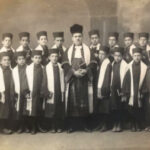
Canto: Baroque Opera and Drag, a Natural Match
'The kinds of roles written for my voice type, as an operatic bass,' writes Michael Galvin in a personal essay, 'have never fit the roles that have excited me as a stage performer. It’s why I’ve been so drawn to early music — the farther back one goes in history, the more the lines blur between what is prescribed and what is possible.'

Canto: We Have the Technology
Even before the ubiquity of Zoom, we were all conditioned to think that in-person musical interactions are always superior to anything online. Always. But what if a musician can't spend the money or time to connect in person? The author argues that newer technology allows us a more nuanced approach: we can pick solutions that are financially, logistically, and artistically preferable.

Canto: Chance Favors the Prepared Voice
Reflections from a whirlwind summer of singing and travel: “It’s hard to be an 'emerging artist.' Even though I’m working more each season, my calendar is a patchwork of jobs I’m constantly worrying over. The upshot of being young and ambitious is that my schedule is more flexible than established artists...so when last-minute opportunities come up, I can often say yes. Still, it’s hard to know what work to accept.”

Canto: Toward a Rebirth of Renaissance Choral Repertoire
Why is Renaissance choral music mostly absent in U.S. schools? From an emphasis on living composers and 'vertical' harmonies to choral directors themselves unfamiliar with the repertoire, there's a lot to discuss.
A choir director asks the questions and offers possible solutions.

Reflections on 400 Years of Sephardic Choral Music
From the 17th century onward, choral music became the defining feature of the musical identity of Western Sephardic Jews.

